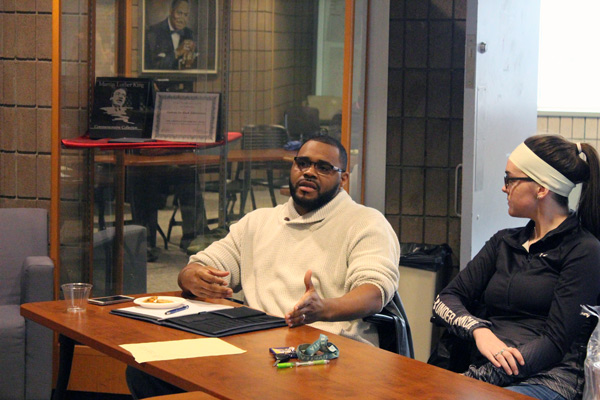The dialogue was honest, informal, and enlightening for participants of the University of Michigan-Flint Center for Educator Preparation’s (CEP) first Critical Issues in Education session last week, addressing how race and racism affect teaching and learning in the school context.
CEP Director Thomn Bell and Richard Russell, coordinator for the STAR Program (Smart Teachers As Role Models) led the session at the University Center’s cultural lounge, eliciting ideas and poignant comments from students who are studying to be elementary or secondary education teachers.
Race and Racism in Schools
The Critical Issues in Education brown bag series provides an opportunity for open dialogue on current issues impacting education and will continue into Winter 2017.
“These conversations about race are important because I don’t think folks know how to talk about them,” Bell told the group. “We really want to create a space for education students, faculty, and staff to talk about these issues that no one really wants to talk about.”
Discussing race and racism can raise defensive feelings or spark awkward interactions, but the topic presents important challenges for teachers leading classrooms that are becoming widely diverse.
“In examining the context of race, racism, and whiteness in teacher education, it is important to also understand the demographics of current teachers and teacher candidates,” Bell explained. “White teachers in the United States continue to make up over 80% of the pre-kindergarten through 12th grade (PK-12) teachers, while students of color make up 50% of the PK-12 classroom demographics.”
Russell, who formerly taught in the Flint Community Schools, talked about some of his experiences dealing with racial incidents and stereotypes both in the community and in the school setting. He posed questions to the group relating to the value of teachers taking extra time to build relationships with children and to understand their home environment.
The Smart Teachers As Role Models (STAR) program at UM-Flint provides a leadership development co-curriculum and mentorship to encourage more minority students to enter the teaching profession. STAR students are actively engaged in Flint classrooms.
Sharing Opinions and Personal Experiences
During the Critical Issues session, STAR student Joe Austin, who is African American and an elementary education major, shared his experiences with racial incidents in his home community. He is passionate about entering the teaching profession and helping young people unlock their talents. He hopes to see new teachers grasp a better understanding of the social obstacles and difficulties that minority students experience on a daily basis in school and at home.
“The community is changing,” Austin said. “If you never talk about race, and never give it a face, it’s like the elephant in the room. Kids are really honest and they’re going to challenge you in class on what you know about it.”
Also attending was UM-Flint student Erin McGill, who is white, and is majoring in mathematics and secondary education. “I think it is really important for people from predominately white areas to share both sides of racial issues whether it makes them uncomfortable or not,” McGill said. “I also believe it’s up to me to get to know my students individually early on and to help them with their own needs.”
The Critical Issues in Education series is hosted by the Center for Educator Preparation, a joint venture between the School of Education and Human Services and the College of Arts and Sciences that supports the preparation and success of pre-service teachers.

